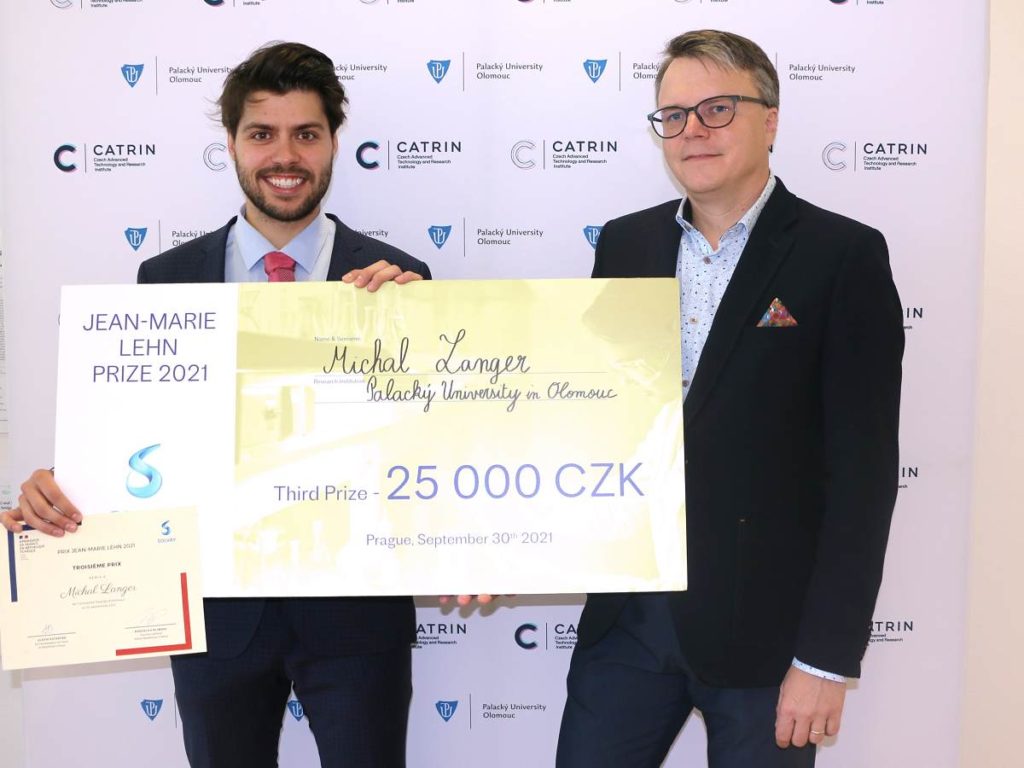Michal Langer wins the Jean-Marie Lehn Prize
Third place in this year’s Jean-Marie Lehn Prize, which the French Embassy along with Solvay, a science company, awards to young scientists in the field of chemistry, goes to PhD student Michal Langer for his research. In the competition, he presented the possibilities of modelling nanoparticles using computational chemistry together with his research on carbon dots. Alongside Michal Langer, Michal Otyepka from CATRIN was awarded this prize too, as Langer’s supervisor.
“I consider this award a huge success. After all, this is a national competition that all PhD students engaged in research in the field of chemistry from universities and institutions under the Academy of Sciences of the Czech Republic could enter. I am grateful to my mentor for including me in his excellent team, for the opportunity to work on projects devoted to world-class science as well as for his effort to push me scientifically further. This experience motivates me to continue working on my professional growth,” said Michal Langer, a PhD student in Physical Chemistry. It was also a great experience for him to meet Jean-Marie Lehn, the 1987 Nobel Prize winner in Chemistry, who hosted the award ceremony on 30 September.
In the contest, this young scientist presented supercomputer modelling of the physico-chemical properties of nanomaterials. “To describe systems from the nano-world, we use various advanced theoretical approaches such as molecular dynamic simulations, calculations based on the time-dependent theory of density functionality, or Monte-Carlo ray-tracing simulations. I also modelled the interaction of a bacterial membrane with nanosilver bound to the surface of cyanographene or calculated the quantum efficiency of solar concentrators,” said Langer.
But the main part of the competitive presentation was the story of the research on carbon dots. “Among other things, we have shown the role of computational chemistry in unlocking the secrets of the nano-world. Thanks to it, and the close collaboration with our experimental team, we have clarified the phenomenon of quenching the fluorescence of carbon dots in the water/ice phase transition,” added the computational chemist, who co-authored several articles published in prestigious peer-reviewed journals.

Even the supervisor, Michal Otyepka, appreciates the many years of cooperation. “I very much welcome my student’s first successes, and I believe they are far from the last. Michal has very quickly adopted a wide range of challenging computational and simulation approaches that allow an understanding of the unusual behaviour of nanomaterials. We recently won a project grant at the supercomputer centre IT4Innovations in Ostrava that will allow Michal to continue his research. In fact, without access to high-tech supercomputers, his research could never have been realized. I look forward to Michal’s continued success and congratulate him once again,” said Michal Otyepka.
In the past, other junior researchers from the Regional Centre of Advanced Technologies and Materials (RCPTM), which is now part of CATRIN, also succeeded in the prestigious scientific awards organised by the French Embassy in the Czech Republic. Five years ago, Markéta Paloncýová confirmed her erudition in computational chemistry with third place in the Joseph Fourier Prize. She also won a special IT 4Innovations award, with Michal Otyepka being her supervisor. Kateřina Holá was another awardee in the Jean-Marie Lehn Prize, winning second place.


